Does Your Sunscreen Contain Microplastic?
To support the running costs of Moral Fibres, this post contains affiliate links. This means Moral Fibres may earn a small commission, at no extra cost to readers, on items purchased through these links.
Does your sunscreen contain microplastic? There’s a high chance it does. Here’s what to look out for, and the brands to trust, as well as actions you can take to help make all sunscreen microplastic-free.
Of all the things that contain microplastic, surely a lotion that you rub on your skin should be microplastic-free? You would think so.
Sadly, it turns out that many sunscreen products available in the UK contain microplastic. This microplastic is, in turn, washed into our waterways when we bathe or shower, or cool off in summer in the sea, causing untold damage to marine life and the wider environment.
If you’re looking to avoid microplastics, it can be tricky to navigate this maze. To help you out, here’s why some sunscreens contain microplastic, the names that microplastics go by on ingredient labels and the sustainable brands that don’t contain plastic.
Table Of Contents
- What Is Microplastic?
- Why Do You Find Microplastics in Sunscreen Products?
- Aren’t Microplastics In Cosmetics Banned?
- The Ingredients to Look For When Buying Sunscreen
- The Sunscreen Brands That Don’t Contain Microplastics
- What Else Can I Do About Microplastic In Sunscreen?
What Is Microplastic?
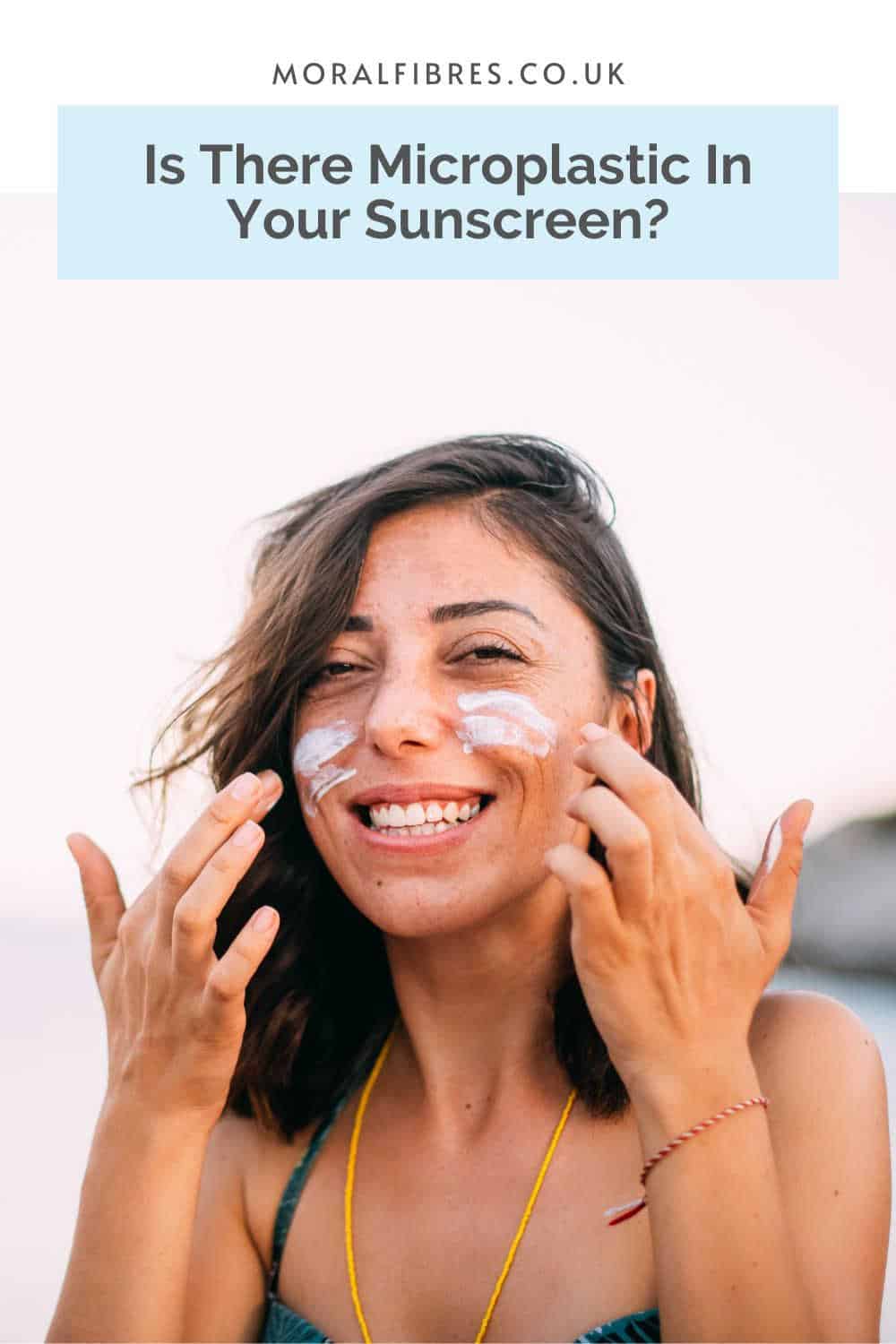
Microplastics are tiny pieces of plastic, less than 5 mm long. Microplastics are found in the soil, in the sea, in our drinking water, inside fish and other animals we eat, and even in humans. When microplastics are in the food we eat and the water we drink, this means we are ingesting plastic. The long-term effects of this are currently unknown.
Microplastics come from a variety of sources. They can derive from larger plastic debris that has degraded into smaller and smaller pieces. It can also come from other sources, such as the products we use that contain microplastics, such as sunscreen, which eventually find their way into our waterways.
Why Do You Find Microplastics In Sunscreen Products?
Although you can’t see the microplastic in your sunscreen, in most cases it’s there. But you might be wondering why microplastics are added in the first place.
Microplastics are added to sunscreen formulas by manufacturers for a variety of reasons – let’s call them the three Ps. Some reasons address practical concerns, while others are more insidious:
- Practicality. Microplastics bind together the product ingredients so that the cream doesn’t split or separate in the tube.
- Protection. The use of microplastics helps to add waterproof properties to your sunscreen, giving you added sun protection in the water, or when you are doing sweat-inducing activities in the sun.
- Profit. Microplastics are often much cheaper alternatives to use, compared to more expensive ingredients that would do the job without the use of plastic.
However, microplastics aren’t necessary ingredients in sunscreens. Some ethical manufacturers have found ways to formulate their sunscreen without the use of plastic, leaving us to wonder why other manufacturers haven’t followed suit.
Aren’t Microplastics In Cosmetics Banned?
You might be thinking that microplastics in cosmetics were banned. And a ban did indeed come into place in Scotland and England in June 2018, when microbeads in rinse-off products were banned.
Here, microbeads – a type of microplastic that manufacturers added to cleansing products to boost their exfoliation properties – were prohibited from being added to cosmetics.
Yet this ban is limited in its nature. As it only applies to rinse-off products – those that are designed to be immediately washed off after using them, such as toothpaste, shower gels, face scrubs, and soap – then it doesn’t apply to products that you apply and don’t immediately wash off.
For products designed to be applied and left on the skin, such as sunscreen, then the UK ban surrounding microplastics doesn’t apply. This is even though we often apply sunscreen and then swim in the sea, or shower after a hot day in the sun. The microplastic then gets washed off in the sea, or washed down the drain, harming the environment.
It’s not just a UK issue. In October 2015, Cosmetics Europe, the European trade association for the cosmetics and personal care industry, whose members include cosmetics and personal care manufacturers, asked its members to stop using microbeads. Like the UK Government, it advised that this action should be limited to rinse-off products only.
It’s clear that the regulations around microplastics don’t go far enough.
The Ingredients To Look For When Buying Sunscreen
Microplastics aren’t simply listed on the ingredients list of your sunscreen as “microplastic”. Instead, you have to be a full-on chemist to know what you are looking for.
According to Beat The Microbead, a campaign against Plastic from The Plastic Soup Foundation, here are nine common names that microplastics can be listed as on a bottle of sunscreen:
- Acrylates/C10-30 Alkyl Acrylate Crosspolymer
- Acrylates/C12-22 Alkyl Methacrylate Copolymer
- Carbomer
- Dimethicone
- Hydroxyethyl Acrylate/Sodium Acryloyldimethyl Taurate Copolymer
- Triacontanyl PVP
- VP/Eicosene Copolymer
- VP/Hexadecene Copolymer
These names don’t exactly roll off the tongue, do they? Looking at this list makes me feel that we shouldn’t be expected to be super consumers, and meticulously scan each sunscreen label looking for all the names that plastic might be listed as.
If sunscreen brands were required to list on their packaging in plain English that their products contained microplastics, then you can bet that these brands would quickly phase out the use of microplastics.
The Sunscreen Brands That Don’t Contain Microplastics
Rather than listing the sunscreen brands that do contain microplastics, I’m simply going to list the sunscreen brands that don’t contain microplastics. This is because, according to Ban The Bead, up to 75% of sunscreen brands contain microplastic. These include popular sunscreen brands such as Cien (Lidl’s own brand), Garnier, and Hawaiian Tropic (see the latest data here).
Instead, here are the more sustainable sunscreen brands free of microplastics.
Beauty Kitchen Daily Primer
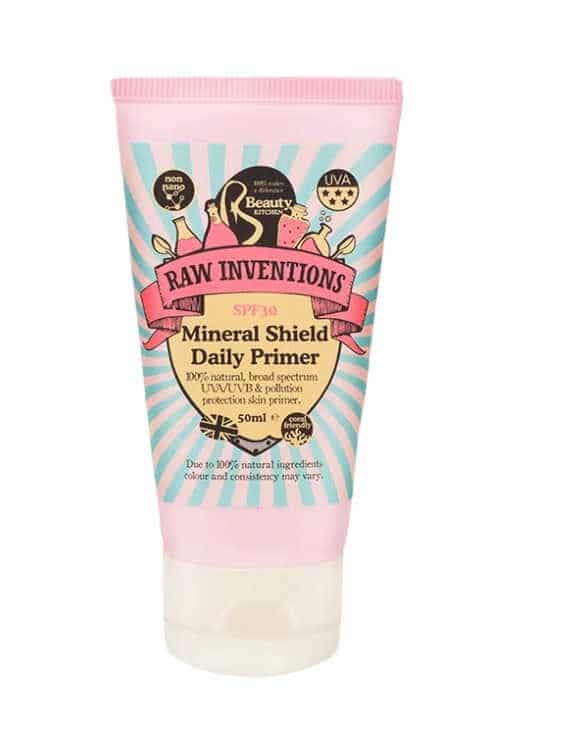
Beauty Kitchen’s SPF 30 Invisible Mineral Shield (£15.00 for 50 ml) offers both UVA and UVB protection.
It is designed as a facial primer, to be worn under your moisturiser or makeup. As such, it’s not the most suitable, nor most economical choice if you’re looking for a full-body product. However, if you are looking for daily sunscreen for your face, then this could be a good choice for you.
The Beauty Kitchen range is made in the UK and all their packaging is made from sustainable materials.
What’s more, you can return almost all empty Beauty Kitchen products back to them to be reused – either directly to Beauty Kitchen by post or via any Holland & Barrett store in the UK.
Green People
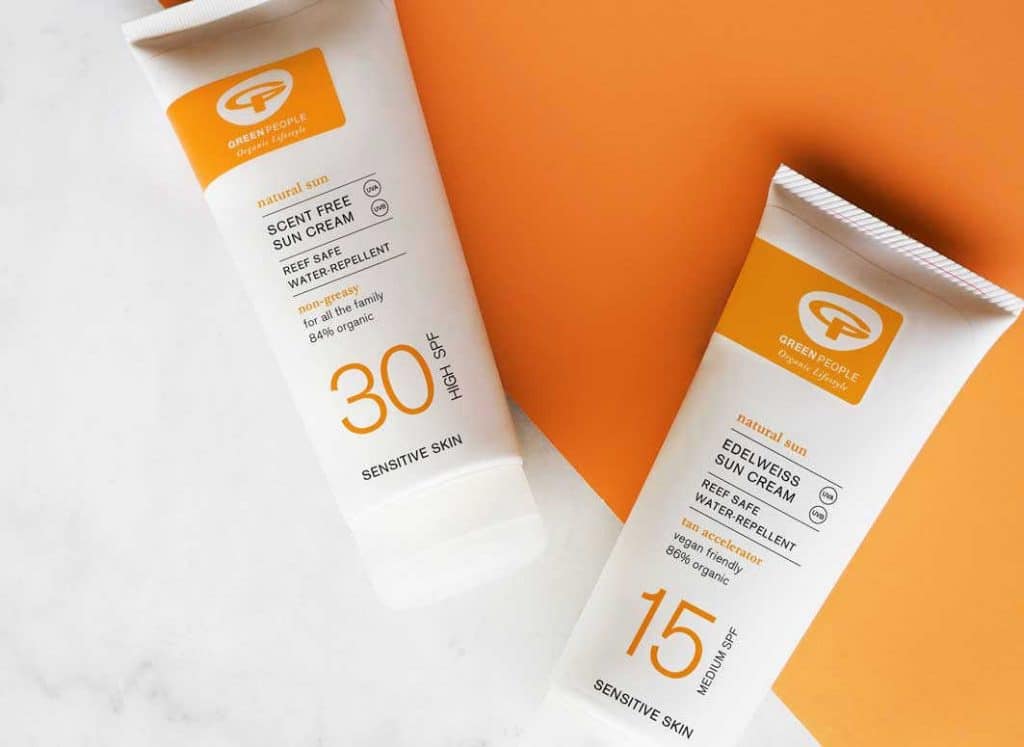
Green People’s entire sunscreen range (from £7.50) is microplastic-free and offers a wide variety of sun protection.
Select from kids’ formulations or scent-free formulations for those with sensitive skin, or facial sunscreen. Whilst not all Green People sunscreens are vegan-friendly, they do sell a specific vegan sunscreen.
Green People’s certified organic formulations are cruelty-free and made without Parabens, alcohol, Lanolin, phthalates, artificial perfumes, petrochemicals, and colourants. What’s more, they also work in partnership with the Marine Conservation Society. So far Green People have raised over £90,000 to support the Society’s work.
I’ve featured Green People in my guide to sustainable sunscreen – it’s one of my favourites that I use on the whole family.
Lovea
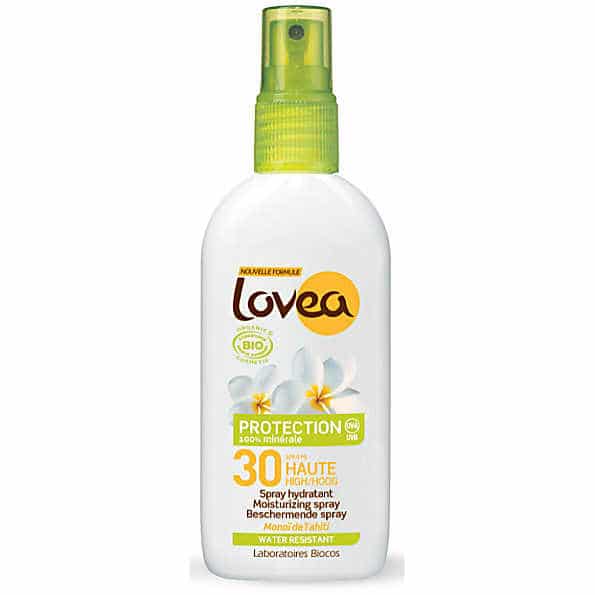
Lovea SPF30 sunscreen (£26.40 at Big Green Smile) is an Ecocert-certified organic sunscreen that provides high UVA & UVB protection, whilst being water-resistant.
Lovea’s vegan-friendly sun care products are made in France, and all their formulas are paraben-free and sulfate-free. What’s more, Lovea does not use genetically modified ingredients, silicone, colourants, nano-particles, or any synthetic scents in its formulations.
Naif
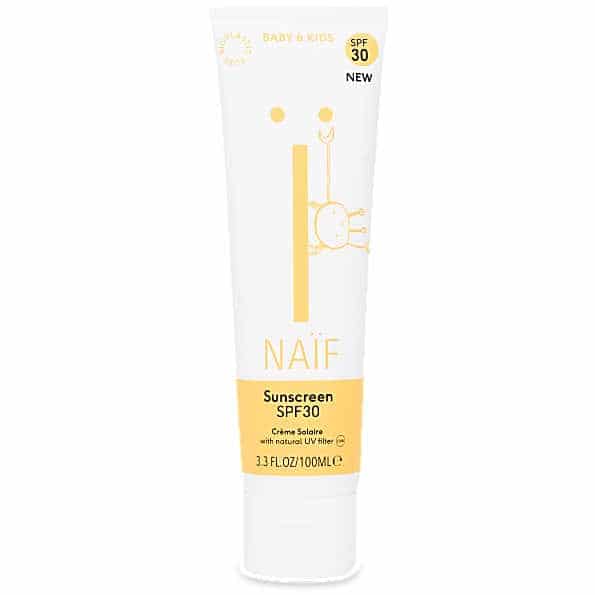
Naif Sunscreen (from Amazon) offers SPF 30 UVA and UVB protection for all ages, including newborns.
It offers natural, mineral UV filters based on zinc oxide. Meanwhile, the cream is easy to apply and doesn’t leave a white layer on the skin thanks to the natural oils in the product.
For extra peace of mind, Naif is B Corp Certified. This is an independent verification that Naïf is committed to a better world when it comes to social impact, responsibility, transparency, and sustainability.
What’s more, all of their products are natural, sustainable and vegan, and do not contain mineral oils, chemical preservatives or harsh chemicals.
Shade
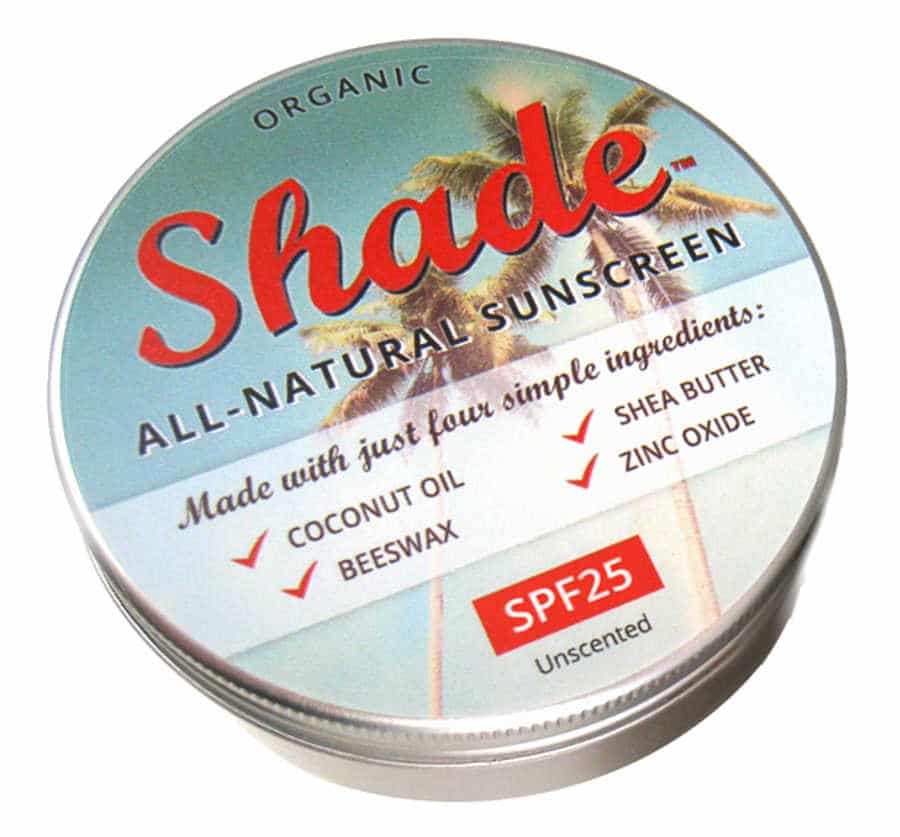
Shade All Natural SPF 25 Sunscreen (£11.75 for 100 ml at Ethical Superstore) is a good choice if you are looking for a microplastic-free sunscreen that doesn’t come in plastic packaging.
Made with only four ingredients, this made in the UK sunscreen is free from alcohol, petrochemicals, triclosan, and many other commonly found chemicals. It’s also palm oil-free and hasn’t been tested on animals.
It does contain beeswax though, so isn’t vegan-friendly.
Weleda Edelweiss Sunscreen
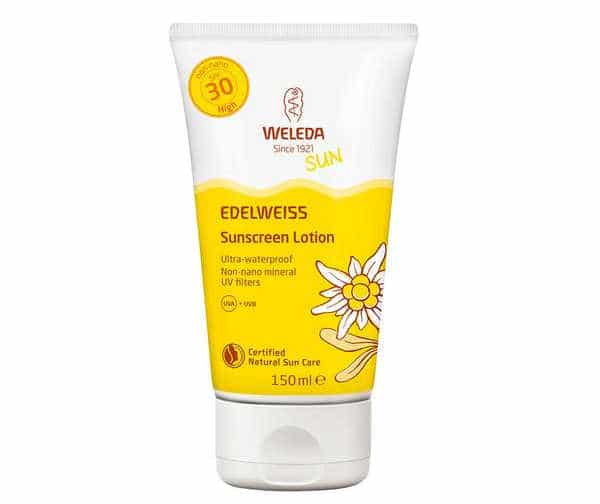
Finally, Weleda’s Edelweiss SPF 50 Sunscreen (available at Amazon) offers UVA and UVB sun protection.
This light, lasting and waterproof vegan sun lotion is blended with organic sunflower oil and non-nano mineral UV filters.
Non-nano means that the sunscreen particles are larger than 100nm and therefore won’t penetrate your skin.
Put simply, this means that the sunscreen acts as a physical barrier. Here it sits on top of your skin and scattering, reflecting or absorbing harmful UVA and UVB rays, rather than absorbing chemicals into your bloodstream.
What Else Can I Do About Microplastic In Sunscreen?
If you can afford it, then switching to a microplastic-free sunscreen, such as one of the ones listed above, is a good first step.
If you can’t afford to make the switch, then it’s important to keep using whatever sunscreen is within your budget.
Sunburn increases your risk of skin cancer. Using sunscreen, as well as seeking shade and covering up in the sun, are the most effective measures you can take to reduce the risk. These alternative sunscreens are more expensive than more accessible sunscreen brands such as Cien. This makes them out of reach to many people. Therefore, don’t feel guilty if you can’t make the switch – it’s not the only action you can take.
Put Pressure on The Government
Even more important than buying microplastic-free products, we need public pressure on the Government to amend the microbead ban to include non-rinse-off products. This will make plastic-free sunscreen accessible to everyone who uses sunscreen, not just those who can afford the pricier alternatives.
Emailing your local MP through the Write To Them website is a good step.
A sample text might look like
Dear [insert name of your MP here], I am writing to you as a constituent of [insert your constituency here] because I am concerned about microplastics.
The Government banned microbeads in rinse-off products in 2018 to help protect sea creatures. However, I’m concerned that the ban does not go far enough. Microplastics are still used in products such as sunscreen, with as many as 75% of sunscreen brands containing microplastics.
Given that after applying sunscreen, many of us swim in our seas, or wash it off in the shower or bath, then it is concerning that these microplastics are polluting our waterways.
On behalf of everyone in [insert your constituency here], will you champion policies in parliament that ensure that the microbead ban goes further, and removes all microplastics from cosmetics and skincare products, such as sunscreen?
I look forward to hearing from you.
Yours sincerely,
[your name]
On behalf of [insert local organisation(s) if relevant]
Postcode
Put Pressure On Sunscreen Brands
We also need to put pressure on sunscreen brands to remove microplastic from their products. Public pressure led to tea bag manufacturers removing plastic from their tea bags. We can do the same with sunscreen. Tweeting brands, emailing brands, and commenting on brands’ Facebook posts are good ways to put pressure on brands.
A sample tweet or Facebook comment might look like this:
@[insert brand name] Is there microplastic in your sunscreen? If so, do you have any plans to remove microplastics from your products?
You can then link to this post or a post from a charity supporting microplastic bans.
This approach would also work in an email.
Support Microplastic Charities
Organisations such as Beat The Microbead tirelessly fight against the microplastics found in cosmetics and personal care products, by educating consumers and engaging with cosmetic brands and governing institutions. Donating to them allows them to continue this vital work.
The Marine Conservation Society also carries out vital work around microplastics and their impacts on the ocean environment. It is currently calling for a ban on all intentionally added microplastics. You can donate to them here, enabling them to continue this important work.
Found this post useful? Please consider buying me a virtual coffee to help support the site’s running costs.


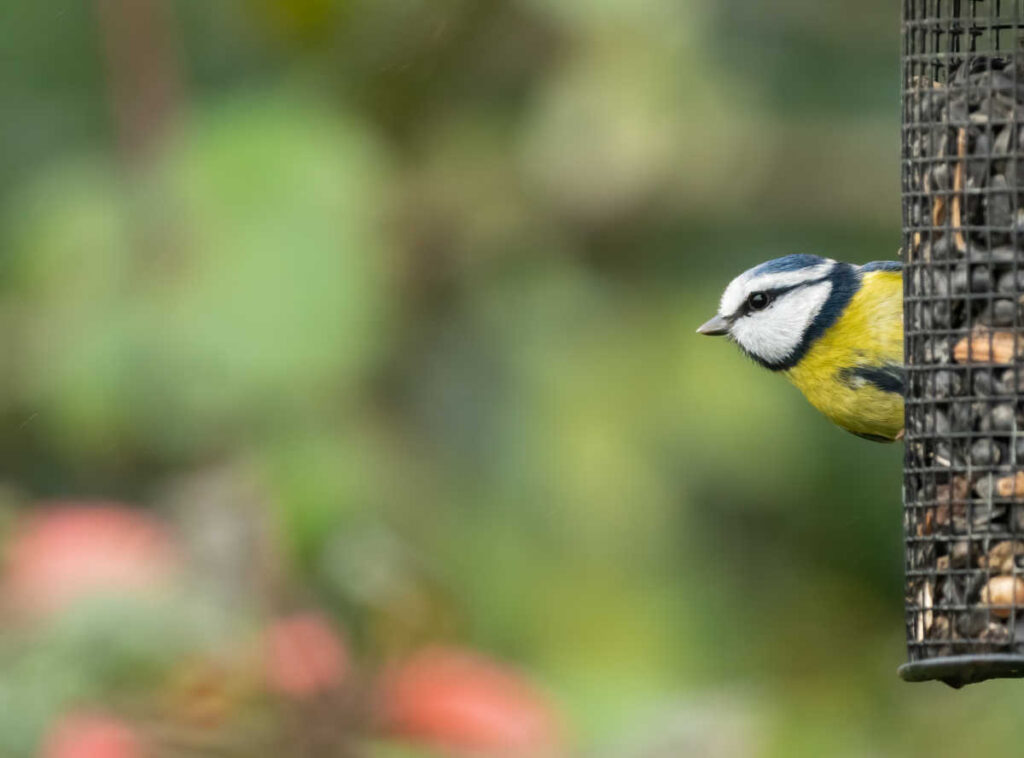
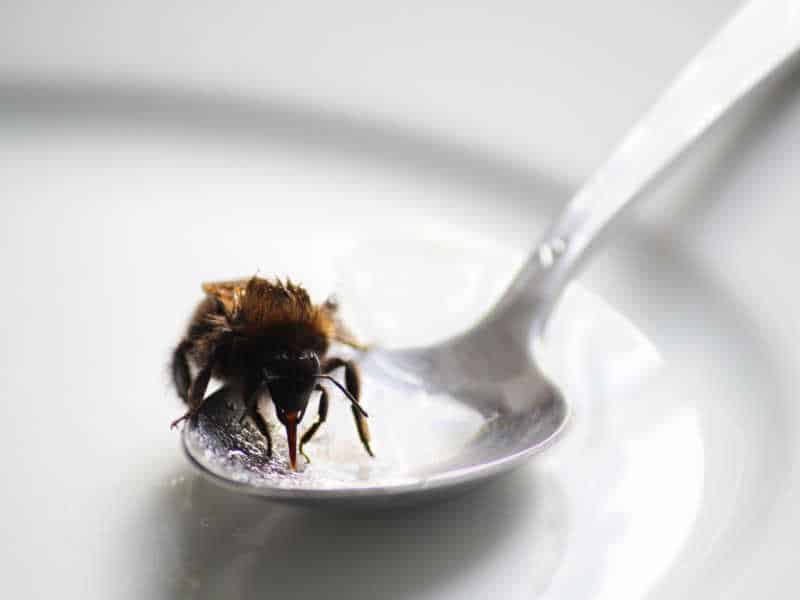
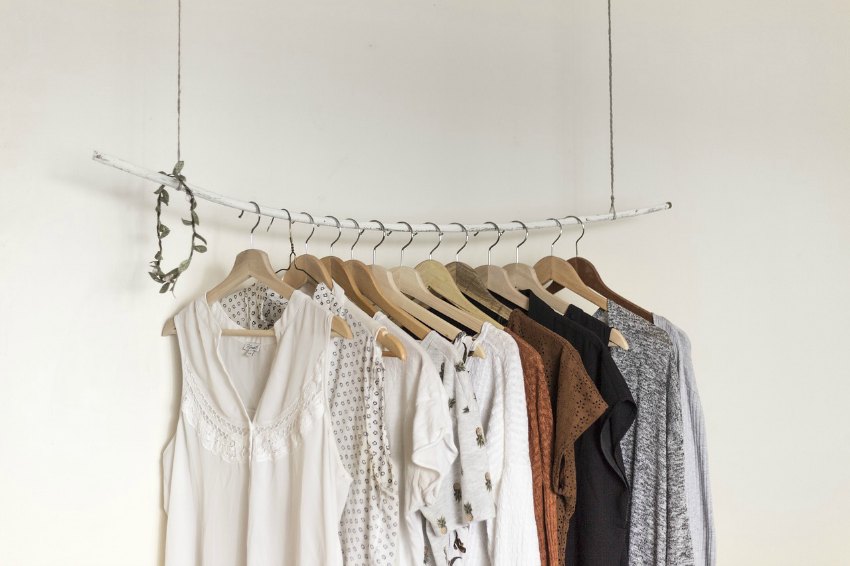
Hi
Very interesting article. I think you maybe should mention that sun lotions made on zinc oxide is not good for the environment either, as zinc oxide has the toughest classification for environmental hazard, H410.
Hi Julie, like anything, unfortunately there’s no perfect answer when it comes to sunscreen. With the proven link between sun exposure and skin cancer, I can’t recommend not using sunscreen, and I believe these sunscreens to be the least negatively impactful ones available.